ADDRESSING RACIAL DISPROPORTIONALITY AND DISPARITIES IN HUMAN SERVICES
Addressing Racial Disproportionality and Disparities in Human Services
MULTISYSTEMIC APPROACHES
Edited by Rowena Fong, Alan Dettlaff, Joyce James, and Carolyne Rodriguez

COLUMBIA UNIVERSITY PRESS NEW YORK
COLUMBIA UNIVERSITY PRESS
Publishers Since 1893
New York Chichester, West Sussex
cup.columbia.edu
Copyright 2015 Columbia University Press
All rights reserved
E-ISBN 978-0-231-53707-0
Library of Congress Cataloging-in-Publication Data Addressing racial disproportionality and disparities in human services : multisystemic approaches / edited by Rowena Fong, Alan Dettlaff, Joyce James, and Carolyne Rodriguez.
pages cm
ISBN 978-0-231-16080-3 (cloth : alk. paper) ISBN 978-0-231-16081-0 (pbk. : alk. paper) ISBN 978-0-231-53707-0 (ebook)
1. United StatesRace relationsHistory. 2. MinoritiesUnited StatesHistory. I. Fong, Rowena, editor of compilation.
E184.A1R32297 2014
362.7089'00973dc23
2014011304
A Columbia University Press E-book.
CUP would be pleased to hear about your reading experience with this e-book at .
Cover design: James Perales
Cover image: Getty
References to websites (URLs) were accurate at the time of writing. Neither the author nor Columbia University Press is responsible for URLs that may have expired or changed since the manuscript was prepared.
TO VULNERABLE CHILDREN, FAMILIES, AND COMMUNITIES WHO HAVE EXPERIENCED DISPROPORTIONALITY AND DISPARITIES.
CONTENTS
Rowena Fong, Alan Dettlaff, and Tianca Crocker
Carolyne Rodriguez, Joyce James, Ratonia C. Runnels, and Rowena Fong
Ruth G. McRoy and Ratonia C. Runnels
Alan Dettlaff, Michelle Johnson-Motoyama, and E. Susana Mariscal
Meripa Godinet, Rowena Fong, and Britt Urban
Kathy Deserly and Tom Lidot
Lawanna Lancaster and Rowena Fong
Henrika McCoy and Elizabeth Bowen
Deena Hayes and Angela M. Ward
Daniel C. Rosen, Ora Nakash, and Margarita Alegra
Susan J. Wells, Sarah Girling, and Andrew Vergara
Alan Dettlaff, Rowena Fong, Joyce James, and Carolyne Rodriguez
Rowena Fong and Alan Dettlaff
 TERRY L. CROSS
TERRY L. CROSSRACE, CULTURE, ETHNICITY, CLASS, NATIONALITY, faith, gender, sexual orientation, and generation are each in their own way complex classifications of people among which we as human beings play out the dynamics of difference, power, and privilege. These are the arenas in which we, as individuals, act out a range of behaviorsfrom unintentional bias to genocide. We are not individuals in isolation, however, but rather beings in relationship with each other. Systems are, in reality, people in relationship to one another. If our individual dynamics regarding how we relate to difference are complex, then the systems we create reflect the same complexity.
One basic human dilemma is how to be with one another in an increasingly diverse world. Even those of us who value diversity and strive for social justice and equity must grapple with the reality that awareness of our unintentional biases, along with learned strategies to mitigate the negative impacts of our most basic human tendencies with regard to those who are different, may be the best we can hope for. Nowhere is this a more poignant reality than in social work, where our primary tool is relationship and where we see the consequences of bias playing out before us in the form of poverty, discrimination, social inequities, disparities, and disproportionality. All of which are, at least in part, reflections of the inadequacies of our fields strategies to change them. Something much larger is at play here.
If we as individuals are inherently wired to react to difference with an us versus them self-preserving response, it is no wonder that the dynamics that are meant to protect us are the very dynamics that threaten to cripple the larger society. Like the human immune system that attacks that which it perceives as different to defend the body, the responses intended to protect us as members of social groups can, as in the case of arthritis, do painful and lasting damage. Played out on the human services stage, this phenomenon contributes to systems that risk perpetuating inequity, trauma, and injustice rather than mitigating them. If we are to change this, we must act on it as certainly and as powerfully as it acts on us in ways that frustrate our aspirations for a better world.
Fong, Dettlaff, James, and Rodriguezs new book faces these issues head-on with a challenging inquiry about systems and their role in achieving greater capacity in social work to work effectively in the context of diversity and, with intention and action, change the way that we address the most pressing social work issues of our time. This book is an opportunity for the reader to get into the balcony, to get a different perspective on the field and its challenges in diversity, and to think about our role in the systems through which we practice our craft. In 50 years, when the field looks back on todays practices, will it view disproportionality in the same way that we today view the boarding school era, orphanages, and institutionalization? This work will help the reader examine that question sooner rather than later.
A GROWING PROBLEM AND A national concern, disproportionality is the overrepresentation of an ethnic population in a system of care, referring to the racial difference of children in a service population when compared to their representation in a general population (Wells, 2011, p. 4). For example, the number of African American children in the public child welfare system has been of concern for four decades, with research raising concerns about racial bias (Dettlaff et al., 2011; James, Green, Rodriguez, & Fong, 2011), disparate treatment (Billingsley & Giovanni, 1972), and racial inequities in systems (Gatowski & Dobbin, 2011). However, the concerns do not limit themselves to the African American community. Latino, Native American, Asian American, and Pacific Islander populations also experience social injustices, a situation that raises concerns related to safety and well-being (Cross, 2011; Dettlaff, 2011; Godinet, Arnsberger, Li, & Kreif, 2011). Other systems besides child welfare have been identified as needing to reduce racial disproportionality and disparities in their assessment practices and intervention planning and in implementation when offering services to children and families of color. To achieve this, more information is needed about the problems facing children and families of color when they interact with the child welfare system, juvenile justice system, mental health system, the schools, and health care systems. This textbook,

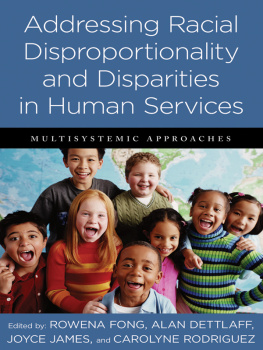

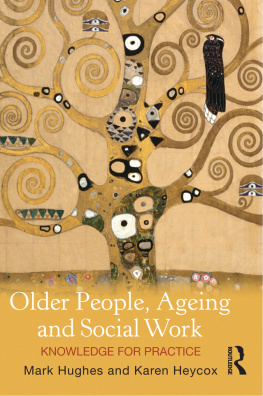
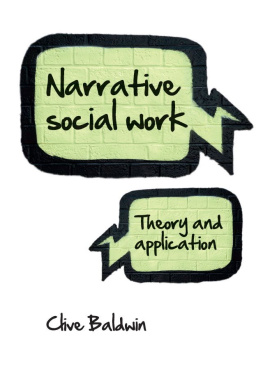
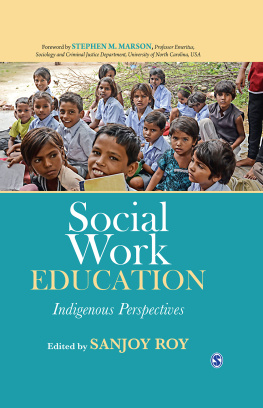
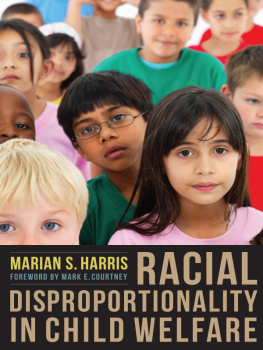
 COLUMBIA UNIVERSITY PRESS NEW YORK
COLUMBIA UNIVERSITY PRESS NEW YORK
